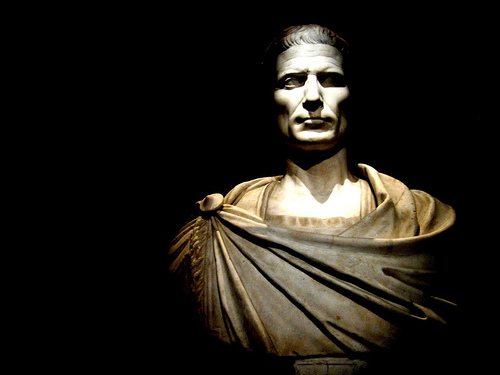The 10 January 49 b.c.. the Roman army, drop by the military campaign in Gaul, crossed armed the Rubicon: the River was the border between the Italian peninsula to the South and the barbarians to the North. This Act represented the end of the Roman Republic, and the beginning of the myth of the biggest character of Roman history: Gaius Julius Caesar. Born around 100 BC, in the Roman Republic, It belonged to the patrician nobility lapsed. As a young man came up to Cicero and Pompey, bonds that earned him election as pontifex maximus in 63 b.c.. and Consul 59 b.c..
In 60 b.c.. clasped, in the famous first triumvirate, an alliance with the two military commanders, Pompey and Crassus: private and secret friendship that was supposed to encourage the Division of their positions and actions. By console, Caesar promoted some agrarian laws for Pompey's Veterans, veterans from military campaigns in the East, and for the poor. Important democratic reforms that followed made him tougher anti bribery legislation and other measures in favor of Pompey and Crassus. From 58 b.c.. He began his campaign in Gaul, whose deeds were brought in De Bello Gallico, and that lasted until 50 b.c.: Caesar submitted all people residing in the current Central Europe. In that year, the 50 BC, ended the mandate of Caesar, who was invited by the Senate of Rome, also and especially intimidated by personal achievements and prestige achieved, back to laying the charge; the Roman orders, in contradiction with the provisions of the Republic, crossed the Rubicon: Alea iacta est ("The die is cast") It was his one sentence. That act done with the army in arms meant declaring war on Republican Rome: Caesar wanted to maintain power and crossing that river if you went and got. The clash with Pompey, representative of Rome, It was inevitable as inevitable was the defeat of the latter. Caesar conquered and ruled Rome and on all territories subject and gathered in what became the Roman Empire with great wisdom. His personal power was extended so much to provoke envy and fear, especially among senators, and to become the pretext for his death, occurred on the IDEs of March (15 March) of 44 b.c.. That morning when Caesar arrived in the Senate was encircled by conspirators, whom, each with a dagger, pierced him with 23 shots, No one mortal with the exception of the second. Et tu, Brute? ("You too, Brutus?”), It was the last sentence of the dictator, who died covering her face with the robes of the tunic, as a sign of modesty. Caesar was Pontifex Maximus, Quaestor, construction, praetor, Console, proconsul, dictator and finally God. Caesar was the ruler of the known world, It was the symbol of the power and greatness of Rome. With time you will forget his deeds, his laws, his reforms, but we cannot forget its myth. Conquered all: Terre, peoples, power, Fame and glory, but especially took a front row seat in our memory.
"Veni, I saw, Vici "
CIT. Gaius Julius Caesar
Roberto Rossetti
